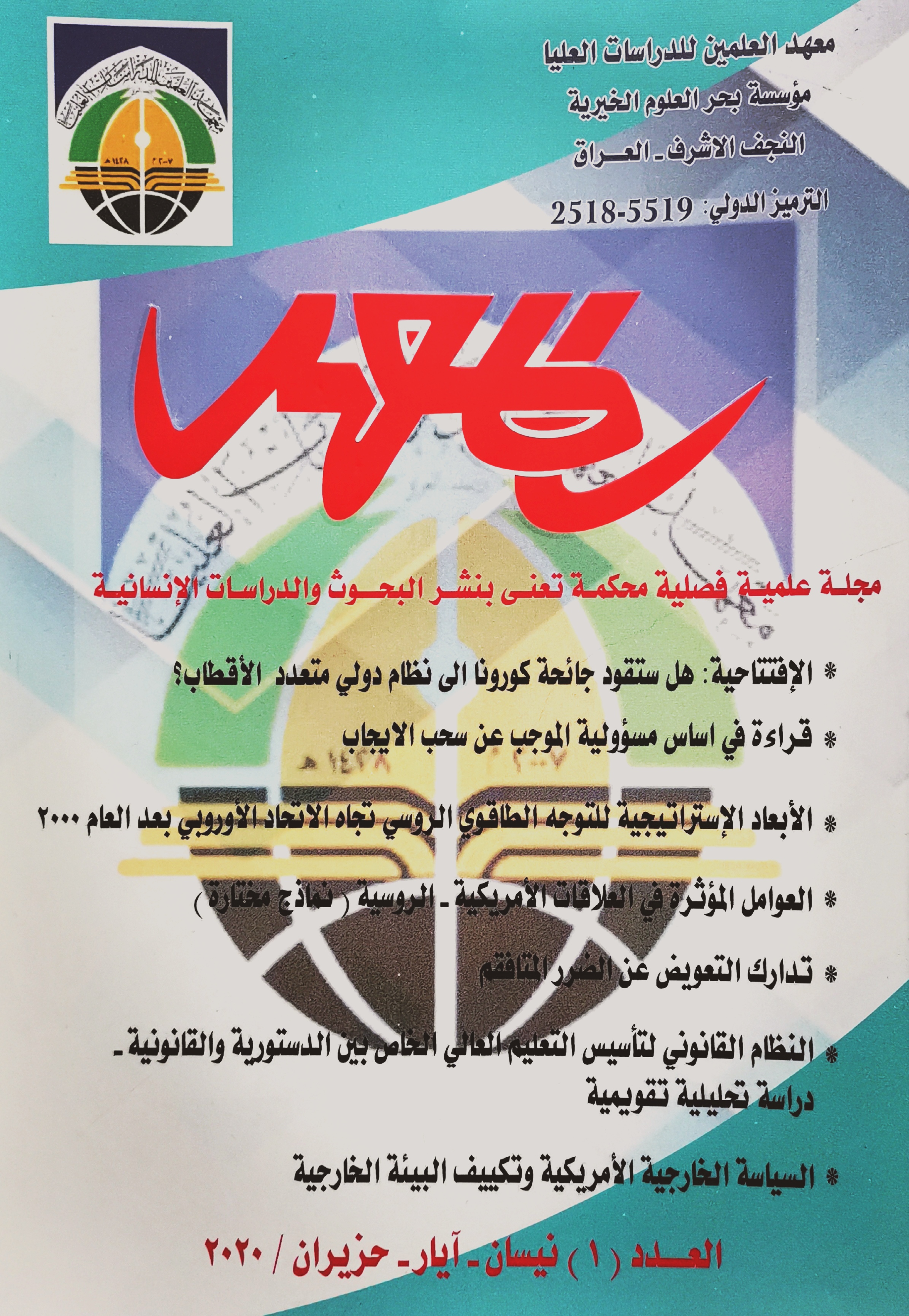السياسة الخارجية الامريكية وتكييف البيئة الخارجية
DOI:
https://doi.org/10.61353/ma.0010001الكلمات المفتاحية:
السياسة الخارجية، الولايات المتحدة الامريكية، البيئة الاقليمية، البيئة الدوليةالملخص
لبت القوة العالمية للولايات المتحدة الكثير من تطلعاتها وإستغلال الفرص لفرض الهيمنة في ظل عولمتها الإقتصادية وقوتها التكنولوجية والعسكرية، ويتجسد ذلك في تكييفها للواقع السياسي الدولي، ورفض الإنعزالية، ومراجعة أسس المنظمات متعددة الأطراف أو توجيه وتهيئة دورها الدولي في ظل تنامي دور قوى منافسة لها على الهيمنة إقليمياً أو دولياً. وقد إنعكس ذلك على قدراتها التكييفية في ظل محددات البيئتين الإقليمية والدولية وتوليف العلاقة بين التأثير والدور، والإحتواء والتهيئة، ضمن تفاعلية معقدة متمددة على صعيدي هيكل النسق الإقليمي والدولي، ومساعي السيطرة على زمام النظام الإقليمي والدولي ضمن مسارها العقائدي والقومي وبما يتواءم مع مصالحها وأمنها القوميين .
تسعى الولايات المتحدة للعمل بشكل أكبر على إبقاء الدول التعديلية وربطها أكثر داخل المؤسسات العالمية والإقليمية وان كانت من بينها دول غير ليبرالية وإلزامها بقواعد ومبادئ متفق عليها . ولأهمية البناء المؤسسي الليبرالي وضرورة عدم إعتراض قيمه، فإن الولايات المتحدة قد تتصرف خارج القواعد والمبادئ المثبتة والتدخل من دون تفويض من الأمم المتحدة. إذ يكون التمييز بين الدول وفقاً للكيفية التي تتواءم مع المصالح الاميركية وترجيح التغيير ونشر الديمقراطية لكسب شرعية أكبر في حالة تدخلها ودعمها لتلك البلدان إذا ما حصل تغيير في أنظمتها السياسية ضمن إطار السلام العالمي، وربط هذه الفكرة بالسلام الإميركي وإعتبار الأول إمتداداً للثاني للإطاحة بالنظم المناوئة.
The global power of the United States has met many of its aspirations and exploiting opportunities to impose hegemony in the light of its economic globalization, technological, and military strength. This has been reflected in its adaptation to international political reality, the refusal of isolationism, a review of the foundations of multilateral organizations or directing and creating its international role in the light of the growing role of competing forces for it to dominate at both regional and international arena. This also has been reflected in its adaptive capabilities in the light of the determinants of the regional and international environments and the synthesis of the relationship between influence and role, containment and preparation, within a complex interactive extended at the levels of the regional and international structure, and endeavors to control the ownership of the regional and international system within its ideological and national path and in harmony with its national interests and security.
The United States seeks to work more to maintain revisionist states, link them more within global and regional institutions, albeit among them non-liberal states, and commit them to agreed rules and principles.
Because of the importance of liberal institutional building and the need not to object to its values, the United States may act outside established norms and principles and intervene without a mandate from the United Nations. The distinction between countries is according to how they are compatible with American interests, weighting change and spreading democracy to gain greater legitimacy in the event of its intervention and support for these countries if there is a change in their political systems within the framework of world peace, and link this idea with American peace and consider the first as an extension of the second to overthrow the opposing regimes.
التنزيلات
منشور
إصدار
القسم
الرخصة
الحقوق الفكرية (c) 2020 ا.متمرس.د فكرت نامق عبد الفتاح، حسن فلاح عبد المهدي

هذا العمل مرخص بموجب Creative Commons Attribution-NonCommercial-NoDerivatives 4.0 International License.







